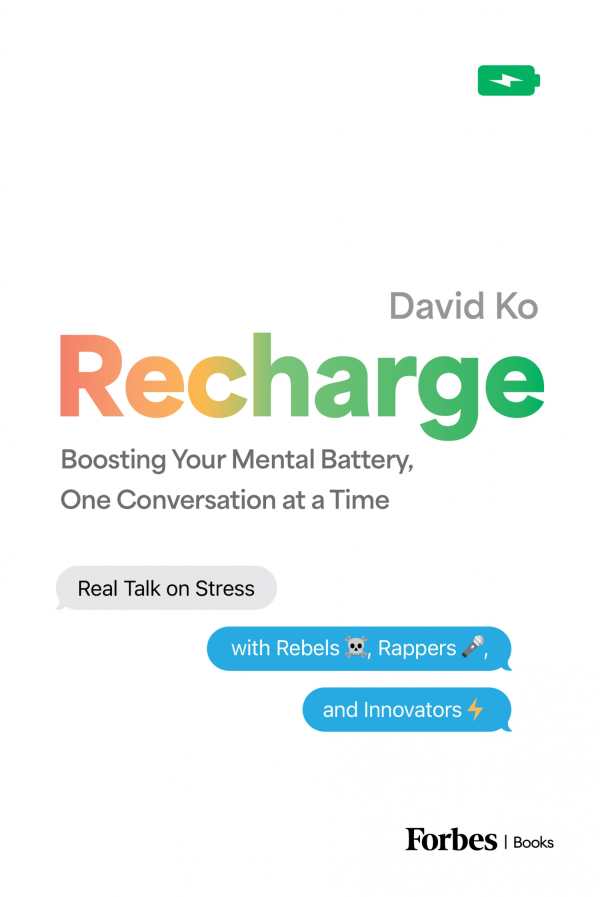Recharge
Boosting Your Mental Battery, One Conversation at a Time
Recharge is an illustrative, conversational self-help book that encourages people to rethink their home and work lives in the name of mental health.
David Ko’s compact self-help guide Recharge distills big ideas around mental health to spark actual change.
In the aftermath of COVID-19, the book says, the mental health crisis in the US deepened. To elevate the cumulative toll of chronic stress and anxiety, it suggests that individuals and businesses take mental health care seriously. It encourages fostering open, honest inward and outward conversations to develop healthier, more connected lives.
Rejecting surface-level niceties and stigmas and embarrassment around well-being, the book urges a shift to more meaningful interactions—progress starts with honest talks, it argues. Illustrative exchanges between Ko and eight notable individuals are held up as examples, including talks with experts in stress and burnout and child and adolescent psychiatry that proffer insights into overcoming issues. Other conversations skim the surface of their topics, though, with the interviewees sharing less.
The organizing metaphor of a depleted phone battery illustrates the need for change well. If people monitored their mental health with the same vigilance they devote to their devices’ power levels, the book says, the mental health crisis might begin to recede. Direct, actionable advice punctuates the text: take regular breaks from any focused activity; spend a few minutes daily in green spaces; reassess your digital habits and sleep routines. All are small, deliberate steps toward balance.
Indeed, practicality defines this conversational text, which asks its audience to reimagine their relationships with technology, to invest in sleep hygiene, and to take better care of themselves, their neighbors, their coworkers, and their loved ones. Business leaders are asked to step up, too, by offering mental health resources, counseling, support networks, mental health days, and adjusted workloads in their organizations in the name of avoiding crushing workers’ spirits at the cost of health and efficiency. Sturdy scientific backing is included for the book’s claims, referenced in an unpretentious manner, as with echoed calls from the surgeon general to treat mental health as an era-defining public health crisis.
There’s a personal element to the book as well, with Ko, who enjoyed Wall Street success during the early internet era and was the CEO of a mindfulness application, referencing his personal struggles, including his battles with mental and physical health and the burden of identity expectations placed on him as a first-generation Korean American. Such experiences are framed as universal, reinforcing the idea that everyone faces hardships—and can step toward healing.
Both gentle and firm, the self-help book Recharge makes mental health care feel approachable, achievable, and necessary.
Reviewed by
pine breaks
Disclosure: This article is not an endorsement, but a review. The publisher of this book provided free copies of the book and paid a small fee to have their book reviewed by a professional reviewer. Foreword Reviews and Clarion Reviews make no guarantee that the publisher will receive a positive review. Foreword Magazine, Inc. is disclosing this in accordance with the Federal Trade Commission’s 16 CFR, Part 255.

